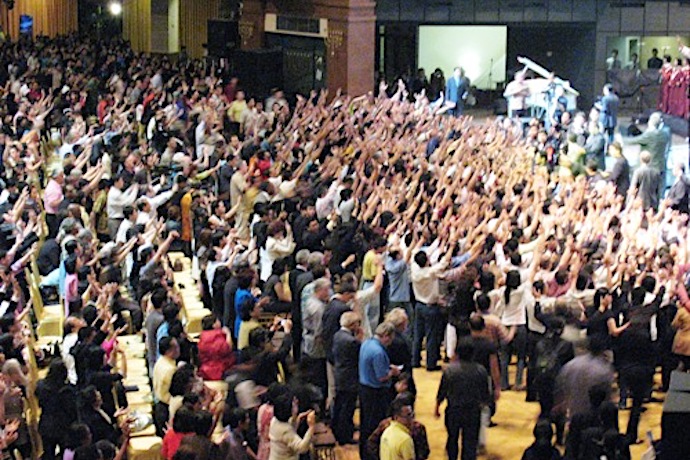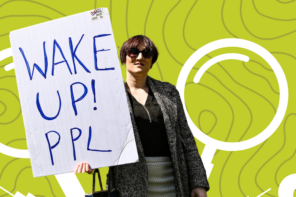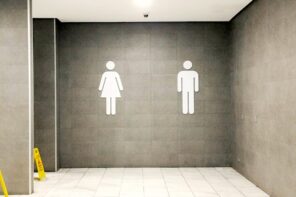Since the murder of eight people at Atlanta-area spas on March 16, there’s been a fierce debate over the causes of the shooting rampage. Some, such as Ruth Graham of the New York Times, have pointed to the gunman’s exposure to the toxic sexual purity culture common to the evangelical world, and how it breeds self-loathing and misogyny.
But members of the AAPI community (as well as RD senior correspondent Chrissy Stroop) have pushed back on this explanation, not without good reason. They point to “sex addiction” being used by law enforcement to deflect from the identities of the dead. As well, they emphasize ways Asian women are hypersexualized, even fetishized, and made racially ‘other’ in American culture. It was no accident, they say, that such a rampage focused on immigrant women. This doesn’t deny that the suspect’s malignant sexual background played a role in the shootings, so much as it puts it in a broader context.
Misogyny and racism aren’t irreconcilable explanations, in other words, and no observer with a clue would deny that they work together. It’s just that focusing on the former at the expense of the latter obscures the dead’s racial reality, and perhaps less important, their religious identities. Why give so much attention to the shooter’s faith while ignoring that of his victims?

Robert De Niro as Travis Bickle in Martin Scorsese’s ‘Taxi Driver.’
One possible way to connect the two sides of the violent coin is to look at how they develop in community. It’s tempting to understand people like the Atlanta gunman as troubled loners on the edges of society—call it the Travis Bickle theory of violence—because after all, they commit abhorrent acts that the vast majority of people would reject. Most people don’t do this sort of thing, ergo the people who do must not be well-connected to most people.
But racial and sexual ideas are formed in community, of course. And as recent research shows about conspiracy theories, it’s exactly the people with deep community ties who are most likely to have those ideas, and to hold them most firmly. QAnon believers aren’t fringe, and typically, neither are racists or misogynists. Instead, they’re firmly embedded in the warm embrace of family, friends, and acquaintances.
Aren’t people who aren’t racist and misogynist also raised in community, though? Indeed they are. The key difference seems to be how homogeneous those communities are, and how permeable their boundaries. According to the American Enterprise Institute’s Survey Center on American Life:
Having a politically homogenous friendship group is associated with not only a greater propensity to embrace conspiracies but also the intensity of these beliefs. Americans who have more close social connections to Trump supporters are more likely to believe in QAnon and believe it emphatically. Republicans who have a lot of Trump supporters in their friendship networks are roughly three times more likely to believe that the QAnon conspiracy theory is “completely accurate” than are those with fewer friends who support Trump.
If there’s no one in a social circle who can correct false information or push back on views, it creates a kind of feedback loop, pushing ideas to the extremes and making them constitutive of group identity. All groups do this to some extent—we all hang out with like-minded people for a reason—but generally speaking, the narrower and firmer the boundaries, the more likely a community is to develop extreme views, and the more likely those views are to be weaponized against outsiders.
Unfortunately, the religious demographic most likely to embrace such ideas is conservative white evangelicals, the same group the Atlanta shooter comes from. The AEI Survey center also concludes that:
A majority of white evangelical Protestants believe there was widespread voter fraud in the 2020 election (62 percent) and believe the deep state was undermining the Trump administration (55 percent). Nearly half (49 percent) believe antifa was mostly responsible for violence perpetrated at the US Capitol.
Worse, as the study notes, that tendency is more pronounced among frequent churchgoers. And though rates are lower in other groups, they’re still too high for comfort: where 27% of white evangelicals believe the Q conspiracy is entirely or somewhat true, it’s 15% of white mainline Protestants and 18% of white Catholics.
Evangelicals are probably more susceptible to this process for two reasons: one necessary, the other contingent. First, the evangelical theology of being saved out of the world leads them to build, what the church sociologist Nancy Ammerman calls, “high walls” between their members and the wider society, creating an all-embracing culture that resists outside perspectives. In other words, evangelical culture promotes firm boundaries and homogeneity.
As well, white evangelicals, especially in the South, have constructed their faith as the foundation of white culture, over and against other parts of society. That nationalism leads them into the Republican party, and specifically what lines, and lined, them up behind former president Trump. That’s not an immutable characteristic, to be clear. Plenty of white evangelicals aren’t MAGA nationalists, and some are actually dedicated to counteracting it. But for the most part, the movement seems to be comfortable embracing religion as the support for and blessing of white nationalism and patriarchy.
In that sense, whatever toxic brew you want to posit motivated the gunman, it can be argued that it’s only a version of what comes out of mainstream white evangelicalism. It’s perhaps more isolated, or more extreme, but not produced by a fundamentally different process, nor does it share fundamentally different values.
To be fair, white evangelicalism at large is not solely responsible for this atrocity, nor is that subculture lining up a thousand little robots to take his place. It would be twisted to imply otherwise. It would also absolve him of the choices he made, and the sickness of American gun culture. At the same time, to paraphrase Reinhold Niebuhr, we may all be guilty of sin, but we’re not all equally responsible. There can be little doubt that the white evangelical community that created him was a primary driver of what he became, no matter how much they would like to distance themselves from him now.
There are cultures across the nation dedicated to separating the children of light from the fallen world, and who approach outsiders with a mixture of fear, ignorance, and contempt. Those circles become petri dishes for hatred, and if the boundaries are drawn sharply enough and the pressure to conform high enough, they inevitably produce someone who takes their inner brokenness out on whichever target they find convenient. Perhaps those individuals were radicalized, or perhaps they just sat in the everyday stew for too long. The result is the same, as is the communal share in the blame.
Because these world views are produced by communities, they must be dismantled by the communities themselves. Raising consciousness about the intersection of racism and misogyny is a good start, but the most frightening thing about the situation may just be that there’s little anyone can do about it, other than wait for tides and cultures to change.





